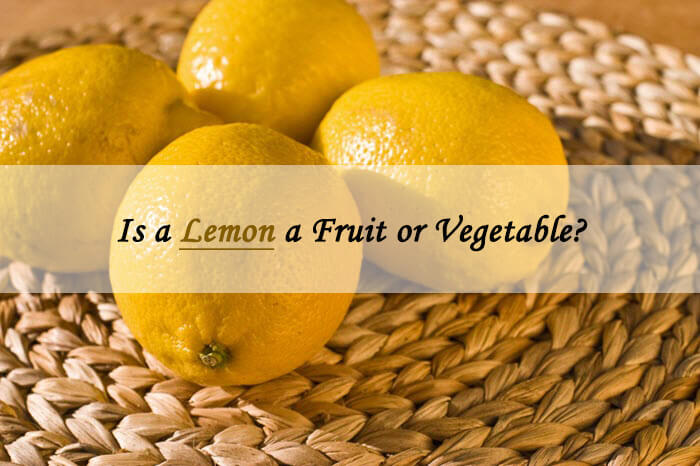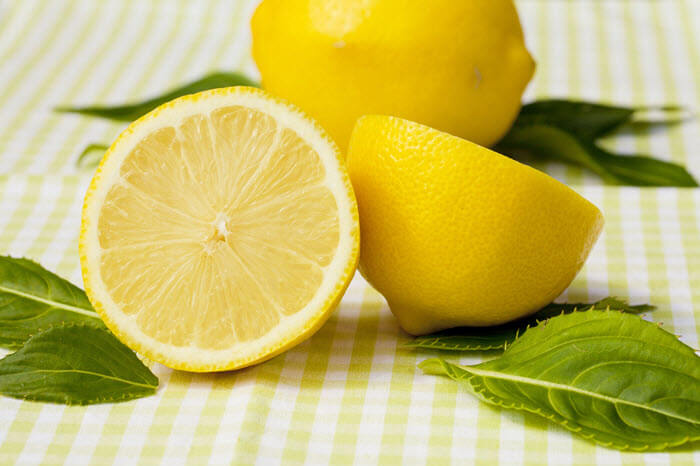Lemon is a versatile food product often used for juices, sauces, drinks, and toppings. Because you can use lemons with so many different things, you may wonder whether they are a fruit or a vegetable.
Key Takeaway
Lemons are fruits. They fall into the citrus family which includes other fruits like limes, oranges, and grapefruits. Although you may use them with vegetables, they are fruit.
Curious to know what makes a lemon a fruit and not a vegetable? Keep reading to learn more.
Table Of Contents
What Makes a Lemon a Fruit?
Lemon is a fruit because it fits the profile of a standard fruit. For starters, it contains seeds, indicating the reproductive process of most fruits.
Lemons can also be categorized along with other similar fruits, such as limes, and have a distinct sour flavor.
Lemons also naturally contain sugars [1], which are more common in fruits than vegetables. These distinctions make a lemon fruit.
What’s the Difference Between Fruits vs. Vegetables?
Seeds
The main difference between a fruit and a vegetable is that fruit has seeds while vegetable does not.
Fruits contain ovules, which are seeds that form inside after reproduction. Vegetables don’t follow this type of reproduction and don’t have seeds.
Taste
Generally speaking, you can often tell the difference between a fruit and a vegetable by taste. You can categorize most fruits into three tastes: sweet, sour, or bitter.
It’s more challenging to categorize vegetables this way. Vegetables each come with their own distinct flavor.
Sugar Content
And finally, fruits and vegetables often differ in terms of sugar content. Fruits are naturally high in sugar, while most vegetables are not.
Is a Lemon a Berry?
The most common way to categorize a lemon is as a part of the citrus group. While it’s true that a lemon is a citrus fruit, we also classify lemons as berries.
Fruits are berries if they have any protective outer layer.
For example, a blueberry has skin, raspberries have fuzz, and lemons have a peel. Berries have this outer layer, fleshy middle and an internal component that holds the seeds.
Lemons aren’t the only berries from their family, either. All citrus fruits are considered berries.
Health Benefits of Lemons
Lemons come jam-packed with tons of great health benefits [2].
While you may not enjoy eating the sour, tart fruit by itself, it can be an excellent addition to a drink or meal that will provide the following benefits.
Weight Control
Some research suggests that lemons are helpful in controlling and losing weight. If you care to eat a whole lemon, the specific fiber found in the pulp can help you feel full for longer, which can minimize excess snacking and overeating.
Additionally, drinking warm lemon water first thing in the morning may help kickstart your metabolism. If your metabolism is ready and active from the start of your day, your body can shed fat quicker.
Combat Kidney Stones
Sometimes, waste products can crystallize and build up in your kidneys. This buildup is called kidney stones, and they can be very dangerous and excruciatingly painful.
Lemon juice, which contains citric acid, can help prevent kidney stones. The citric acid contributes by increasing the pH of your urine, making it more difficult for kidney stones to form.
The research is a bit iffy on the certainty of this theory, but it doesn’t hurt to try.
Healthy Immune System
It’s no secret that lemons are bursting with vitamin C, which plays a significant role in a healthy, well-equipped immune system. Lemons are also abundant in zinc, another critical player in immune health.
Lemons and lemon juice can help your body resist infections, reduce the severity of infections, and improve cellular functions to fight germs.
You can purchase vitamin C in powders, pills, and gummies, but you can also get a solid intake naturally by adding some lemons to your diet.
Improve Digestion
Most of the carbs in lemons are soluble fiber and simple sugars. The fiber in lemons has a positive impact on overall gut health [3].
It’s important to remember that this fiber is found in the meat of the lemon, so you need the pulp to reap the rewards.
FAQs About Lemons
Still curious about lemons are their various features? Keep reading for some frequently asked questions about the tart fruit.
Why do lemons taste sour?
Lemons are sour because they contain citric acid. Citric acid exists in many fruits but particularly in citrus – hence the name. When the concentration of citric acid is higher in a fruit, it tastes more sour.
For example, lemons have a higher concentration of citric acid than oranges, and it’s obvious given how different the two fruits taste.
Is lemon water bad for your teeth?
As previously mentioned, lemon juice has a high concentration of citric acid. The natural acids in lemon juice can cause erosion of your teeth’s enamel.
Enamel serves as the outer protective layer on your teeth, so daily lemon water could negatively affect that protection.
Can you eat lemon seeds?
Lemon seeds are safe to consume if you accidentally swallow a couple. The seeds of lemon contain many of the same health benefits that the juice and pulp offer.
Lemon seeds are not easily digested, though, so it’s best to avoid eating them whole. If they’re not too hard, you can try chewing them. You can also crush them and add them to your drink.
What do you get when you mix lemon with gunpowder?
This question is an old riddle. The answer to this riddle is lemonades, which is a play on the explosive grenade.
Final Thoughts
To sum it up, lemons are classified as citrus fruits and berries.
Lemons contain tons of health benefits, but too many of them can have some lasting impacts on your teeth.
Add lemons and lemon juice to your daily diet to see improvements in digestion, weight, and immunity.
Related Post



